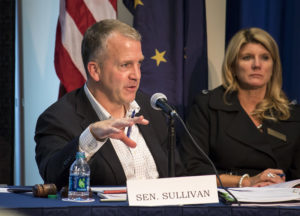
You and Your Survival Guy have been watching the problems with ESG funds and all-powerful money managers voting your shares for years now. Finally, someone in Washington, DC, is realizing how bad this is for America. Senator Dan Sullivan of Alaska plans to introduce legislation that will force money managers to allow investors to vote their own shares. The Wall Street Journal’s Angel Au-Yeung reports:
A group of Republican senators is looking to curtail the power big asset managers like BlackRock Inc. and Vanguard Group have over public companies.
In legislation to be introduced Wednesday, Sen. Dan Sullivan (R., Alaska) calls for voting choice to be made available to individual investors in passive funds when money managers own more than 1% of a company’s voting securities.
Big asset managers like BlackRock, Vanguard and State Street Corp. STT -1.56% have grown rapidly in recent years, fueled by investors hoping that index-tracking funds can get them broader access to the market at a lower cost. Collectively, those three firms alone manage $20 trillion in assets.
One unexpected consequence of their growth is the huge voting power these firms have accumulated, since they typically vote on behalf of investors. They have pushed companies to improve diversity, cut their climate emissions, and embrace other changes, sometimes drawing criticism from conservatives who say their votes represent a creeping liberal bias.
“Look, this is not an attack against these companies or their executives from the perspective of what they have been able to achieve,” Mr. Sullivan said, highlighting passive funds’ lower fees and greater diversification as benefits to investors. The bill is co-sponsored by 11 other Republican senators. It so far doesn’t have any support from Democrats, who control the Senate.
Mr. Sullivan said he started looking at the asset managers after speaking with leaders in the Alaskan energy sector, who told him shareholder resolutions from climate activists had put pressure on their businesses.
In 2020, BlackRock Chief Executive Larry Fink steered the firm to consider environmental, social and governance risks as consequential as credit and liquidity risk. In a letter at the time, he said climate change “has become a defining factor in companies’ long-term prospects.”
Action Line: Whether or not this bill passes, you have to question why any investor would want to give their money to a firm that took away their control. If you want to talk to someone who can help you build an investment plan where you control all your shares, get in touch.
Originally posted on Your Survival Guy.



